#Foreign debts
Explore tagged Tumblr posts
Text
معاشی بہتری یا طفل تسلیاں

موجودہ حکومت کو معرض وجود میں آئے ہوئے تقریباً نو ماہ ہونے کو ہیں اور کوئی شک نہیں کہ اس نے اِن نو مہینوں میں معاشی بہتری کے لیے بہت سے کام کیے ہیں لیکن کیا اُن کے نتیجے میں ہم اس خطرناک صورتحال سے باہر نکل آئے ہیں اور ڈیفالٹ ہو جانے کا خطرہ یقیناً ٹل چکا ہے۔ اس کا جواب یقیناً نہ اور نفی میں ہوگا۔ ابھی ہمارے ڈیفالٹ ہوجانے کا خطرہ صرف دو تین مہینوں کے لیے ٹلا ہے۔ 2021 بر��در اسلامی ملک سعودی عرب نے انتہائی برے وقت میں ہمارا ہاتھ پکڑا اور تین ارب ڈالر ہمارے خزانے میں صرف اس مقصد سے ڈیپازٹ کر دیے کہ ہم کہیں حقیقی طور پر دیوالیہ ظاہر نہ ہو جائیں۔ دنیا کی نظروں میں ڈیفالٹ ہونے سے بچانے کی خاطر سعودی عرب نے ایک حقیقی دوست اور بھائی کا کردار ادا کیا۔ حالانکہ اسے معلوم تھا کہ یہ تین ارب ڈالر اسے ایک سال میں واپس بھی نہیں ملیں گے اور ہوا بھی ایسا ہی ہم ہر سال ایک درخواست لے کر اُن کے دربار میں پہنچ جاتے ہیں اور مزید ادھار مانگنے کے بجائے یہی تین ارب ڈالرزکی واپسی کے لیے مزید مہلت مانگ لیتے ہیں۔ سوال یہ ہے کہ اگر سعودی ارب یہ مہلت دینے سے انکار کر دے تو ہم کہاں کھڑے ہونگے؟ معاشی طور پر دیوالیہ ہوجانے سے بچ جانے کے ہمارے دعوے کتنے درست اور حقیقی ثابت ہوں گے۔
کیا ہم دھڑام سے زمین بوس نہیں ہوجائیں گے۔ یہی حال UAE سے لیے تین ارب ڈالروں کا بھی ہے اور چین سے ادھار پیسوں کا بھی۔ ہم کب تک اسی طرح کام چلاتے رہیں گے اور اپنے آپ اور قوم سے جھوٹ بولتے رہیں گے۔ IMF اگر ہمیں نئے قرض کی منظوری نہیں دیتا تو بھی ہمیں ڈیفالٹ ہوجانے سے کوئی بھی نہیں بچا سکتا تھا۔ پھر یہ ادھار کے ڈالرز بھی کام نہیں آتے۔ IMF کی مہربانی سے ہمیں کچھ دنوں کے لیے سانس لینے کا موقع ضرور مل گیا ہے لیکن دیوالیہ ہوجانے کے خطروں سے ابھی ہم باہر نہیں نکل پائے ہیں۔ حیران کن بات یہ ہے کہ ابھی ہمیں IMF کے قرض سے صرف ایک قسط ملی ہے اورہم نے اپنے شاہانہ خرچ یک دم بڑھا دیے ہیں۔ ایک ماہ قبل ججوں کی تنخواہوں میں دو سو فیصد اضافہ کر دیا اور اب اپنے پیٹی بھائیوں یعنی پارلیمنٹرین کی مشاہرے میں بڑا اضافہ کر دیا۔ حکومت ایک طرف ٹیکس جمع کرنے کے مطلوبہ ہدف کو پورا بھی نہیں کر پا رہی ہے اور دوسری طرف اپنے اخراجات میں بے تحاشہ اضافہ بھی کر رہی ہے، حالانکہ وزیر اعظم اور وزیر خزانہ نے ایک بار نہیں کئی بار قوم کو یقین دہانیاں کروائی ہیں کہ حکومت اپنے اخراجات کم کرنے والی ہے اور آنے والے دنوں میں ہم واضح طور پر اس کمی کو دیکھ پائیں گے، مگر افسوس سے کہنا پڑتا ہے کہ حکومت نے اپنے اس وعدے کی ایک شق پر بھی عمل نہیں کیا۔

حکمرانوں اور پارلیمنٹرین میں سے ایک شخص بھی ایسا نہیں سامنے آیا جس نے اس غیر ضروری اضافے کو مسترد کیا ہو یا اس کی مخالفت کی ہو۔ عوام سے تو توقع کی جاتی ہے کہ وہ ملک کے معاشی حالات کو دیکھتے ہوئے اپنے اخراجات کم کر دے اور قربانیوں پر قربانیاں دیتی رہے لیکن اعلیٰ عہدوں پر بیٹھے یہ تمام کے تمام افراد اپنے اخراجات ایک فیصد بھی کم کرنے کو تیار نہیں، بلکہ وہ اس اضافے کے ثمرات سمیٹ لینے کے لیے مکمل طور پر متفق اور متحد ہیں۔ اپوزیشن میں سے بھی کسی ایک شخص نے اس اضافے کے خلاف ایک آواز بھی بلند نہیں کی۔ ویسے وہ حکومت کے ہر کام پر تنقید اور تنقیص کرتے دکھائی دیتے ہیں مگر ذاتی مفاد کے اس فیصلے پر وہ بھی خاموشی طاری کیے ہوئے ہیں۔ مہنگائی کے حوالے سے حکومت کا دعویٰ ہے کہ اس نے دس مہینوں میں بڑھتی مہنگائی کی شرح چھ فیصد تک لے آئی ہے۔ یہ کہتے ہوئے وہ سمجھتی ہے کہ اس نے عام عوام کے لیے مہنگائی بہت کم کر دی ہے۔ حالانکہ دیکھا جائے تو سوائے ایک آدھ چیز کے مہنگائی کسی اور شہ میں کم نہیں ہوئی ہے، بلکہ اس میں کچھ اضافہ ہی ہوا ہے۔ مہنگائی میں کمی کے دعوے کرتے ہوئے یہ بھول جاتی ہے کہ مہنگائی کی روز افزوں شرح جو ایک سال پہلے تک تیس فیصد تک پہنچ چکی ہے وہ اب چھ سات فیصد تک آگئی ہے۔
یعنی مہنگائی تو پھر بھی ہو رہی ہے۔ بے تحاشہ کے بجائے چھ سات فیصد ماہانہ کی شرح پر۔ اب ہمیں بتایا جائے کہ عوام کو اس طرح کیا ریلیف ملا۔ اسے تو آج بھی اپنی اسی آمدنی سے چھ فیصد مزید مہنگی چیزیں خریدنی پڑ رہی ہے۔ بات تو جب تھی کہ جن اشیائے ضروریہ کے دام پہلے ہی بڑھ چکے تھے انھیں کم کیا جاتا۔ نہ کہ مزید چھ سات فیصد اضافہ کر کے عوام کو ریلیف بہم پہنچانے کے دعوے کیے جاتے۔ دنیا کے ہر ملک میں جو چیزیں پیدا ہوتی ہیں یا بنائی جاتی ہیں وہ وہاں کے عوام کو ہمیشہ سستی اور ارزاں قیمتوں پر ملا کرتی ہیں لیکن ہمارے یہاں کا معاملہ عجیب و غریب ہے۔ یہاں ہر چیز چاہے وہ امپورٹ کی گئی ہو یا خود ہمارے یہاں پیدا ہوتی ہوں، بین الاقوامی قیمتوں کے مطابق دستیاب ہونگی۔ گندم ، چاول اور چینی وافر مقدار میں ہمارے اپنے یہاں پیدا ہوتی ہے لیکن عوام کو وہ بھی ڈالرکی قیمت یا دوسرے ملکوں میں ملنے والی قیمت کے حساب سے مہیا کی جاتی ہیں۔ اس کے لیے بہانہ یہ بنایا جاتا ہے کہ اگر سستی ہونگی تو پھر ان اشیاء کی اسمگلنگ شروع ہو جائے گی۔ ہماری سمجھ میں نہیں آتا کہ معاشی حوالے سے حکومت کی ترجیحات کیا ہیں۔
لانگ ٹرم منصوبے کیا ہیں۔ صرف وقتی علاج اور قرض حاصل کر کے خزانے کا وزن بڑھا دیا گیا ہے۔ پی آئی اے اور مالی بحران کے شکار کئی ادارے آج بھی قوم کے خون پسینے کی کمائی کھا رہے ہیں۔ انھیں فروخت کرنے یا پرائیوٹائز کرنے میں سست روی دکھائی جا رہی ہے۔ دو تین برسوں سے ��نتے آئے ہیں کہ کئی ادارے نجی تحویل میں دیے جانے کا پروگرام ہے لیکن ایک ادارہ بھی آج تک فروخت نہیں کیا گیا۔ خسارے میں چلنے والے ادارے اب اس حال میں پہنچ چکے ہیں کہ کوئی بھی انھیں خریدنے والا نہیں۔ ملک میں پائی جانے والی معدنیات کے حوالے سے بھی کوئی ٹھوس پالیسی سامنے نہیں آئی ہے۔ انھیں نکالنے کے منصوبے ابھی تک محض کاغذوں پر موجود ہیں۔ ہمارے پڑوسی ممالک بھی ہم سے بہت آگے نکل چکے ہیں اور ہم چند مہینوں کے زرمبادلہ کے ذخائر جمع کر لینے پر اطمینان کا اظہار کر رہے ہوتے ہیں۔ وہ ذخائر جو دوست ممالک کی مہربانیوں کی وجہ سے قائم ہیں، وہ اگر قائم نہ رہیں تو پھر ہمارا کیا ہو گا؟ سوچنے اور غور کرنے کی بات ہے صرف تسلیاں دینے سے اب کام نہیں چلے گا۔
ڈاکٹر منصور نورانی
بشکریہ ایکسپریس نیوز
0 notes
Text
غیرملکی قرض، مال مفت دل بے رحم
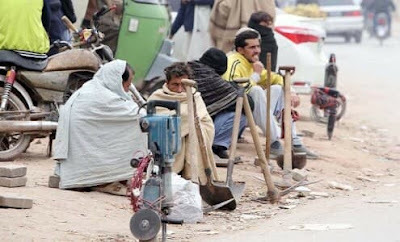
موجودہ حکومت سے ہرگز یہ توقع نہ تھی کہ IMF سے قرضہ منظورہوتے ہی وہ بے دریغ اپنے اخراجات بڑھا دے گی۔ وہ صبح وشام عوام سے ہمدردی اور انھیں ریلیف بہم پہنچانے کے دعوے توبہت کرتی رہتی ہے لیکن عملاً اس نے انھیں کوئی ایسا بڑا ریلیف نہیں پہنچایا ہے جیسا اس نے اپنے وزرا اور ارکان پارلیمنٹ کو صرف ایک جھٹکے میں پہنچا دیا ہے۔ ہمارے وزیر خزانہ ہر بار عوام کو یہ تسلیاں دیتے دکھائی دیتے ہیں کہ آپ اگلے چند ماہ میں حکومتی اخراجات کم ہوتے دیکھیں گے۔ اُن کے مطابق حکومت جسے اپنے غریب عوام کا بہت خیال ہے وہ بہت جلد سرکاری اخراجات کم کرے گی، مگر ہم نے پچھلے چند ماہ میں اخراجات کم ہوتے تو کیا بلکہ بے دریغ بڑھتے ہوئے ہی دیکھے ہیں۔ افسوس سے کہنا پڑتا ہے کہ ہمارے نام نہاد مسیحا عوام سے تو ہر وقت قربانی دینے کی درخواستیں کرتے ہیں لیکن خود وہ کسی بھی قسم کی قربانی دینے کو تیار نہیں ہیں۔ یہ سارے کے سارے خود ساختہ عوامی غم خوار اللہ کے فضل سے کسی غریب طبقہ سے تعلق نہیں رکھتے ہیں۔
اِن میں بہت سے بڑے بڑے جاگیردار اور سرمایہ دار لوگ ہیں۔ پشت درپشت اِن کی جاگیریں ان کی اولادوں میں بٹتی رہی ہیں۔ اُن کی زمینوں کا ہی تعین کیا جائے تو تقریباً آدھا پاکستان انھی لوگوں کی ملکیت ہے۔ اِنکے گھروں میں وہ فاقے نہیں ہو رہے جن سے ہمارے بیشتر عوام دوچار ہیں۔ ملک میں جب بھی کوئی بحران آتا ہے تو یہ سب لوگ ترک وطن کر کے دیار غیر میں جا بستے ہیں۔ جن لوگوں سے یہ ووٹ لے کر پارلیمنٹ کے منتخب ارکان بنتے ہیں انھیں ہی برے وقت میں تنہا چھوڑ جاتے ہیں۔ وطن عزیز کے معرض وجود میں آنے کے دن سے لے کر آج تک اس ملک میں جب جب کوئی بحران آیا ہے قربانیاں صرف غریب عوام نے ہی دی ہیں۔مالی مشکلات پیدا کرنے کے اصل ذمے دار یہی لوگ ہیں جب کہ قربانیاں عوام سے مانگی جاتی ہیں۔ ٹیکسوں کی بھرمار اور اشیائے خورونوش کی گرانی عوام کو برداشت کرنا پڑتی ہے۔ IMF کی کڑی شرطوں کا سارا بوجھ عوام پر ڈالا جاتا ہے اور عالمی مالی ادارے جب کوئی قرضہ منظور کر دیتے ہیں تو شاہانہ خرچ اِنہی خیر خواہوں کے شروع ہو جاتے ہیں۔

ہماری سمجھ میں نہیں آرہا کہ ارکان پارلیمنٹ اور حکومتی اہل کاروں کی تنخواہوں میں یکمشت اتنا بڑا اضافہ کرنے کی بھلا ایسی کیا بڑی ضرورت آن پڑی تھی کہ پچاس فیصد نہیں سو فیصد نہیں چار سو سے لے کر نو سو فیصدی تک ایک ہی چھلانگ میں بڑھا دی گئی ہیں۔ جب کہ ان بھاری تنخواہوں کے علاوہ دیگر مراعات اور بھی دی جارہی ہیں۔ ان کے گھر کے اخراجات بھی حکومت کے خزانوں سے پورے کیے جاتے ہیں۔ بجلی، گیس اور ٹیلیفون تک کے بلوں کی ادائیگی عوام کے پیسوں سے کی جاتی ہے۔ پارلیمنٹ کے اجلاسوں میں حاضری لگانے کے الاؤنس بھی اس کے علاوہ ملتے ہیں۔ پارلیمنٹ کی کیفے ٹیریا میں انھیں لنچ اور ڈنر بھی بہت ہی ارزاں داموں میں ملا کرتے ہیں۔ اِنکے سفری اخراجات بھی عوام کے ٹیکسوں سے پورے کیے جاتے ہیں، پھر کیا وجہ ہے کہ انھیں اتنی بڑی بڑی تنخواہوں سے نوازا گیا ہے۔ IMF نے ابھی صرف ایک ملین ڈالر ہی دیے ہیں اور ہمارے مسیحاؤں نے فوراً ہی اس میں سے اپنا حصہ سمیٹ لیا ہے، مگر جب یہ قرض ادا کرنے کی بات ہو گی تو عوام سے وصول کیا جائے گا۔
حکومت نے تو یہ کام کر کے اپنے ساتھیوں کی دلجوئی کر دی ہے مگر ہمیں یہ توقع نہ تھی کہ اپوزیشن کے ارکان اس کی اس حرکت پر خاموش رہیںگے۔ پاکستان تحریک انصاف جو ہر حکومتی کام پر زبردست تنقید کرتی دکھائی دیتی ہے اس معاملے میں مکمل خاموشی طاری کیے ہوئے ہے۔ اس بہتی گنگا میں اس نے بھی اشنان کرنے میں بڑی راحت محسوس کی ہے اور مال غنیمت سمجھ کر جو آتا ہے ہنسی خوشی قبول کر لیا ہے۔ یہاں اسے اپنے غریب عوام کا ذرہ بھر بھی خیال نہیں آیا۔ کوئی منحنی سی آواز بھی پارلیمنٹ میں بلند نہیں کی۔ غریب عوام کو ابھی تک اس حکومت سے کوئی بڑا ریلیف نہیں ملا ہے۔ مہنگائی کی کمی کے جو دعوے کیے جارہے ہیں تو زمینی حقائق کے بالکل برخلاف ہیں، کسی شئے کی قیمت کم نہیں ہوئی ہے۔ جس آٹے کی قیمت کم کیے جانے کا دعویٰ کیا جا رہا ہے وہ ایک بار پھر پرانی قیمتوں کو پہنچ چکا ہے۔ عوام کی سب بڑی مشکل بجلی اورگیس کے بلز ہیں۔اس مد میں انھیں ابھی تک کوئی ریلیف نہیں ملا ہے۔
��ردیوں میں صرف تین ماہ کے لیے جو رعایتی سیل حکومت نے لگائی ہے۔ وہ بھی حیران کن ہے کہ جتنی زیادہ بجلی خرچ کرو گے اتنا زیادہ ریلیف ملے گا۔ یعنی گزشتہ برس اِن تین سال میں عوام نے جتنی بجلی خرچ کی ہے اس سے زیادہ اگر وہ اس سال اِن تین مہینوں میں خرچ کریں گے تو حکومت اس اضافی بجلی پر کچھ ریلیف فراہم کریگی۔ سبحان اللہ سردیوں میں عام عوام ویسے ہی کم بجلی خرچ کرتے ہیں انھیں زیادہ بجلی خرچ کرنے پر اکسایا جا رہا ہے۔ یہ ریلیف بھی انھی امیروں کو ملے گا جو سردیوں میں الیکٹرک ہیٹر چلاتے ہیں۔ غریب عوام کو کچھ نہیں ملے گا۔ اس نام نہاد ریلیف کی تشہیراخبارات میں بڑے بڑے اشتہاروں کے ذریعے کی جارہی ہے جنھیں دیکھ کر عوام قطعاً خوش نہیں ہو رہے بلکہ نالاں اور سیخ پا ہو رہے ہیں ۔ خدارا عقل کے ناخن لیں اورصحیح معنوں میں عوام کو ریلیف بہم پہنچانے کی کوشش کریں۔ غیرملکی قرضوں سے انھیں نجات دیں اور کچھ دنوں کے لیے سکھ کا سانس لینے دیں۔ ابھی معیشت پوری طرح بحال بھی نہیں ہوئی ہے اور قرض کو مال مفت سمجھ کر اپنے ہی لوگوں میں تقسیم کر دیا گیا۔ اسے اس بے رحمی سے خرچ کیا جارہا ہے جیسے پھر کبھی موقع نہیں ملے گا۔ کسی بھی رکن پارلیمنٹ کا سویا ہوا ضمیراس شاہانہ اخراجات پر نہیں جاگا۔
IMF جو حکومتی ہر اقدام پر کڑی نظر رکھتی ہے وہ بھی نجانے کیوں اس غیر ضروری فراخدلی پر خاموش ہے۔ وہ دراصل چاہتی بھی یہی ہے کہ یہ ملک اور اس کے عوام اسی طرح قرض لینے کے لیے ہمیشہ اس کے محتاج بنے رہیں اور وہ چند ملین قرض دینے کے بہانے ان پر پابندیاں لگاتی رہے۔ وہ ہرگز نہیں چاہتی کہ ہم اس کے چنگل سے آزاد ہو کر خود مختار اور خود کفیل ہو پائیں۔ اس کی ہشت پالی گرفت ہمیں کبھی بھی اپنے شکنجہ سے نکلنے نہیں دے گی۔ یہ سی پیک اور معدنیات کے بڑے بڑے ذخائر سب فریب نظر ہیں۔ ہم کبھی بھی اِن سے فیضیاب نہیں ہو پائیںگے۔ ہمیں برباد کرنے کے لیے تو اُن کے پاس بہت سے آپشن ہیں۔ کبھی سیاسی افراتفری اور کبھی منتخب حکومت کی اچانک تبدیلی۔ کبھی ایران کے ساتھ تجارتی معاہدوں پر پابندیاں تو کبھی سی پیک رول بیک کرنے کی کوششیں۔ اسی طرح اور ممالک نے بھی ایسے ہی کئی MOU سائن کیے ہیں لیکن وہ بھی صرف کاغذوں پر موجود ہیں ،عملاً کوئی قدم بھی ابھی نہیں بڑھایا ہے۔ حالات جب اتنے شکستہ اور برے ہوں تو ہمیں اپنا ہاتھ بھی ہولہ رکھنا چاہیے۔ پڑوسی ملک بھارت کے زرمبادلہ کے ذخائر ہم سے کہیں زیادہ ہیں لیکن وہاں کے پارلیمنٹرین کی تنخواہیں اور مراعات ہم سے بہت ہی کم ہیں۔ یہی سوچ کر ہمارے حکمرانوں کو احساس کرنا چاہیے کہ ہم کیونکر اتنے شاہانہ خرچ کے مرتکب ہو رہے ہیں۔
ڈاکٹر منصور نورانی
بشکریہ ایکسپریس نیوز
0 notes
Text
پاکستان کو قرض و سود سے بچانے کی ایک تجویز

��اکستان کو سود اس تیزی سے کھا رہا ہے کہ اب تو ہمارے بجٹ کا بڑا حصہ سود کی ادائیگی میں چلا جاتا ہے۔ سود کی مد میں مالی سال 2023-2024 میں 7300 ارب روپے مختص کیے گئے تھے لیکن کہا جا رہا ہے کہ سود کی ادائیگی اس سال کوئی 8300 ارب روپے سے بھی زیادہ ہو گی جبکہ آئندہ سال سود کی ادائیگی کیلئے مختص تخمینہ کوئی 9500 ارب روپے کے لگ بھگ ہے۔ ہمارے قرضے (جن میں بہت بڑا حصہ اندرونی قرضوں کا ہے) اتنے بڑھ چکے ہیں اور بڑھتے جا رہے ہیں کہ اگر کوئی حل نہ نکالا گیا تو پاکستان اپنا بجٹ بھی نہیں بنا سکے گا کہ سارے کا سارا بجٹ ہی سود کی ادائیگی پر خرچ ہو جائے تو پھر ملک کیسے چل سکتا ہے؟؟ کچھ عرصہ قبل مجھے ایک صاحب ملنے آئے جن کا نام قانت خلیل اللہ ہے۔ وہ ایک چارٹرڈ اکائونٹنٹ ہیں اور کچھ اہم اداروں سے منسلک رہے ہیں۔ اُن کا کہنا تھا کہ پاکستان کے اندرونی قرضے فوری طور پر ختم ہو سکتے ہیں جس سے سود کا بوجھ ختم ہو جائے گا۔ قانت صاحب نے دی نیوز میں اس سلسلے میں تین آرٹیکل بھی لکھے جبکہ وہ مختلف فورمز پر جا کر اپنی تجویز بھی سب کے سامنے رکھ رہے ہیں۔
میں نے وزیراعظم شہباز شریف صاحب سے بھی درخواست کی تھی کہ اپنی معاشی ٹیم کو کہیں کہ قانت صاحب کو سنیں اور اگر اُن کی تجویز میں کوئی وزن ہے تو اُس پر سنجیدگی سے غور کر کے پاکستان کو سود کے اس سنگین خطرے اور گناہ کبیرہ سے بچائیں۔ ابھی تک تو قانت صاحب سے حکومت کی طرف سے تو کوئی رابطہ نہیں کیا گیا لیکن میں نے اُن سے درخواست کی کہ مجھے اردو زبان میں قرضوں اور سود کے اس بوجھ کو ختم کرنے کیلئے اپنی تجویز لکھ کر بھیجیں تاکہ میں اُسے اپنے کالم میں شائع کر سکوں۔ ان کی تجویزدرج ذیل ہے: ’’جدید بینکنگ نظام میں دو قسم کی کرنسی یا پیسے ہوتے ہیں: بینک نوٹ (جو مرکزی بینک جاری کرتا ہے) اور بینک ڈپازٹ، جو کمرشل بینکوں کے قرضے ہوتے ہیں۔ عمومی نقطہ نظر سے، بینک ڈپازٹس نقد رقم رکھنے کے برابر ہیں۔ بینک جب قرضے جاری کرتے ہیں، نئے روپے تخلیق کرتے ہیں، کیونکہ اسی وقت بینک اکاؤنٹس میں نمبر (بینک ڈپازٹس) ظاہر ہوتے ہیں۔

بینک آف انگلینڈ کے الفاظ میں: ’’جب ایک بینک قرض دیتا ہے، اسی لمحے، نیا پیسہ تخلیق ہوتا ہے۔ مثال کے طور پر، کسی کو گھر خریدنے کیلئے قرض دینے والے کو بینک ہزاروں پاؤنڈ مالیت کے نوٹ نہیں دیتا۔ اس ک�� بجائے، وہ ان کے بینک اکاؤنٹ میں قرض کے برابر بینک ڈپازٹ کریڈٹ کرتا ہے۔‘‘ (بینک آف انگلینڈ سہ ماہی بلیٹن، 2014 Q1) زیادہ سے زیادہ منافع کمانے کیلئے، تجارتی بینکس زیادہ قرضے جاری کرنے کی کوشش کرتے ہیں۔ فریکشنل ریزرو سسٹم کے تحت صرف 6-5 فیصد مرکزی بینک کی ریزرو کرنسی کے ساتھ، بینک قرضے جاری کر سکتے ہیں اور تقریباً بیس گنا تک بینک ڈپازٹ میں اضافہ کر سکتے ہیں۔ تاہم، ان کے پیسہ کی توسیع سے ہونیوالی افراط زر یا مہنگائی کو مرکزی بینک بلند شرح سود کی پالیسی کے ذریعے کنٹرول کرنے کی کوشش کرتا ہے تاکہ قرض لینے کی سرگرمی کی حوصلہ شکنی کی جا سکے۔ تاہم جیسا کہ اوپر ذکر کیا گیا ہے، پاکستان میں بلند شرح سود پالیسی مؤثر نہیں ہے کیونکہ تجارتی بینکوں کی سب سے بڑی قرض دار حکومت پاکستان خود ہی ہے، جو قرضے واپس کرنے کی پوزیشن میں نہیں ہے۔
دلچسپ بات یہ ہے کہ پیسے کی تخلیق کے قانونی اختیارات کے باوجود، پاکستان کی ریاست نجی بینکوں سے بڑے پیمانے پہ اور قرضے لے رہی ہے تاکہ پرانے قرضوں پر سود ادا کر سکے۔ یہ ایک مسلسل عمل ہے؛ حکومت سود کی ادائیگی کیلئے قرض لیتی ہے، جس سے حکومت کا قرض بڑھتا ہے، اور سود کی ادائیگی کے نتیجے میں بینک ڈیپازٹس میں اضافہ ہوتا ہے۔ ہم پیسے کی فراہمی میں اضافے کی وجہ سے افراط زر کا سامنا کر رہے ہیں، اور ہمارے بچوں پر حکومتی قرض کا بوجھ مسلسل بڑھتا چلا جائے گا۔ پاکستان کے سنگین معاشی مسائل کا حل مکمل ریزرو بینکنگ کا نفاذ ہے۔ اس نظام کی تائید بیسویں صدی کے بڑے ماہرین معاشیات ، جن میں ملٹن فریڈ مین اور فشر نمایاں ہیں، نے کی ہے اور اس کے نفاذ کو نہایت ہی قابل عمل اور آسان بتایا ہے۔ یہ منظم مالیاتی نظام بھاری سرکاری قرضوں کے بوجھ اور ان پر سود کے اخراجات کو ختم کرنے کی پوری صلاحیت رکھتا ہے۔ یہ منصوبہ مالیاتی استحکام کو یقینی بنانے، افراط زر کو کنٹرول کرنے اور اقتصادی خوشحالی کو فروغ دینے کے مقاصد کو حاصل کر سکتا ہے۔ فریکشنل ریزرو سسٹم، جو پیسے کی فراہمی میں اتار چڑھاؤ اور اقتصادی عدم استحکام کا ذمہ دار ہے، اس کو مکمل ریزرو سسٹم سے تبدیل کیا جا سکتا ہے۔ نیا تجویز کردہ نظام درج ذیل بنیادی اصولوں پر کام کرے گا:
۱۔ تجارتی بینکس قرض جاری کرنے اور انویسٹمنٹ کرنے کے عمل میں نیا پیسہ /کرنسی تخلیق نہیں کرسکیں گے۔ ۲۔ پیسہ تخلیق کرنے کی صلاحیت ایک خود مختار ادارے جیسے اسٹیٹ بینک کو منتقل کی جائے گی جو جی ڈی پی میں اضافے کے برابر نیا پیسہ تخلیق کر یگا تاکہ مہنگائی یا افراط زر نہ ہو۔ ۳۔ نیا تخلیق کردہ پیسہ غریب طبقے کی بنیادی ضروریات اور انفراسٹرکچر کی تعمیر کیلئے استعمال کیا جائے گا تاکہ اشیا کی طلب کے ساتھ سپلائی میں بھی موثر اضافہ ہو۔
سو فیصد (100%) ریزرو سسٹم میں، بینکوں کو پابند کیا جائے گا کہ وہ اپنے تمام ڈپازٹس کیلئے 5 فیصد کی جگہ 100 فیصد تک مرکزی بینک کی ریزرو کرنسی رکھیں۔ نتیجتاً، بینک کے قرضوں سے نیا پیسہ تخلیق کرنے کا عمل بند ہو جائے گا، اس کے بجائے، بینکوں کو قرضے جاری کرنے کیلئے پہلے سرمایہ حاصل کرنے کی ضرورت ہو گی، اس سے پیسے کی فراہمی میں بڑے پیمانے پر اتار چڑھاؤ کو روکا جاسکے گا۔ مزید یہ کہ بینکوں کو مرکزی بینک کی ریزرو کرنسی کو حاصل کرنے کیلئے حکومتی بانڈز اور ٹریژری بلز اسٹیٹ بینک کے حوالے کرنا ہوں گے، اور کیونکہ 100 فیصد ریزرو کرنسی کی مقدار بینکوں کے پاس تقریباً 60 فیصد حکومتی بانڈز سے زیادہ ہے اسلئے اس سے بینکوں کے علاوہ دوسرے اداروں اور لوگوں کے ہاتھوں میں حکومتی بانڈز اور قرضہ بھی ادا کر دیئے جائیں گے اور اس طرح پاکستان کا پورا داخلی قرض ختم ہو سکے گا۔ یہ نیا نظام اسلام کے مقاصد اور مالیاتی اصولوں کے عین مطابق ہے۔
سب سے اہم بات یہ ہے کہ موجودہ نظام کے مقابلے میں جہاں 90 فیصد سے زیادہ کرنسی، تجارتی بینکس قرض دیتے وقت تخلیق کر رہے ہیں اور کرنسی اور قرض ایک ہی سکے کے دو رخ ہیں، اس نئے نظام میں پیسہ قرض کے بغیر تخلیق کیا جائیگا اور یہ حقیقی اشیا کی پیداوار کے تناسب سے ہو گا۔ مزید یہ کہ موجودہ بینکنگ سسٹم کے برعکس، ڈیپازٹ ہولڈرز کو انویسٹمنٹ اور نفع نقصان میں شرکت کے بغیر کوئی منافع نہیں ملے گا، ان کو اپنی رقم بینکوں کو ٹرانسفر کرنا ہو گی جو اس رقم کو مختلف کاروباری اداروں میں انویسٹ کر کے منافع کمائیں گے اور تقسیم کریں گے۔ روپے کی قدر اس نظام میں مستحکم رہے گی کیونکہ تجارتی بینک قرض کے ساتھ روپے کی سپلائی نہیں بڑھا رہے ہوں گے۔ اس نئے نظام میں حکومت کا 6 ہزار ارب کا سودی خرچ ختم ہو جائے گا اور اسکے پاس ٹیکس کے علاوہ تقریباً 2 ہزار ارب کی نئی تخلیق کردہ کرنسی ہو گی، اسلئے حکومت کو اپنی مالی ضروریات پوری کرنے کیلئے بینکوں سے قرض لینے کی ضرورت نہیں پڑے گی، جس سے افراط زر کے نتیجے میں ہونے والی مہنگائی ختم ہو جائے گی۔
حکومت اپنی مالیاتی پالیسیوں کو مؤثر طریقے سے نافذ کر سکے گی، اور سود کی ادائیگی کیلئے رکھی گئی رقم، سماجی اور اقتصادی ترقی کے منصوبوں میں استعمال ہو سکے گی۔ مجموعی طور پر، 100%ریزرو بینکنگ ایک جدید اور پائیدار حل پیش کرتی ہے جو پاکستان کے سنگین اقتصادی مسائل کو حل کر سکتی ہے، مالیاتی استحکام کو یقینی بنا سکتی ہے، اور پاکستان اور اس کے عوام کیلئے ایک خوشحال مستقبل کی بنیاد رکھ سکتی ہے۔‘‘
انصار عباسی
بشکریہ روزنامہ جنگ
0 notes
Text
بیرونی قرضوں پر انحصار سے نجات کیسے؟

پاکستان اپنے قیام سے ہی غیر ملکی قرضوں پر بہت زیادہ انحصار کرتا آ رہا ہے۔ اس رجحان میں گزشتہ چند سالوں کے دوران خطرناک حد تک اضافہ ہوا ہے۔ اس وقت پاکستان کے قرضوں کا حجم مجموعی قومی پیداوار کے 90 فیصد تک پہنچ چکا ہے جو کہ مالیاتی رسک اور قرض کی حد بندی ایکٹ 2005ء کی مقرر کردہ 60 فیصد حد سے بھی زیادہ ہے۔ بیرونی قرضوں کے حجم میں اضافے کی وجہ سے گزشتہ بیس سال کے دوران قومی ترقیاتی اخراجات کا حجم 20 فیصد سے کم ہو کر 12 فیصد پر آ گیا ہے جس کی وجہ سے صحت اور تعلیم جیسے اہم شعبوں پر حکومتی سرمایہ کاری مسلسل کم ہو رہی ہے۔ اس طرح یہ کہا جا سکتا ہے کہ ماضی میں ترقی کی شرح میں اضافے کیلئے قرض لینے کی پالیسی کے قومی معیشت پر مثبت اثرات مرتب نہیں ہوئے۔ تاہم یہ بھی حقیقت ہے کہ بیرونی قرضے پاکستان جیسے ترقی پذیر ممالک کو تجارتی خسارے کو سنبھالنے اور اہم شعبوں کو فنڈ دینے کیلئے مالی معاونت کا بنیادی ذریعہ ہیں۔ اس صورتحال میں نئی حکومت کیلئے جاری معاشی بحران سے نمٹنے کیلئے ضروری ہے کہ وہ مختلف ترقیاتی اشاریوں اور جمع شدہ غیر ملکی قرضوں کے درمیان روابط کا باریک بینی سے تجزیہ کرے۔
اس طرح کی جانچ پڑتال ملک کے معاشی بحرانوں سے نمٹنے اور پائیدار ترقی کو یقینی بنانے کیلئے موثر حکمت عملی وضع کرنے کیلئے ضروری ہے۔ ہمارے لئے یہ موازنہ اس لئے بھی ضروری ہے کہ پاکستان کی معیشت اس وقت جس معاشی بحران سے دوچار ہے اس کی بڑی وجہ بیرونی قرضوں کا بڑھتا ہوا حجم ہے جو معاشی استحکام کیلئے خطرہ بن چکا ہے۔ قومی معیشت پر بیرونی قرضوں کے بوجھ کی ایک بڑی وجہ پاکستان کی آبادی میں ہونے والا تیز رفتار اضافہ بھی ہے۔ اس خطرے کا اندازہ اس بات سے لگایا جا سکتا ہے کہ آبادی کے حجم کے لحاظ سے پاکستان دنیا کا پانچواں بڑا ملک ہے جبکہ معاشی لحاظ سے پاکستان دنیا میں 46ویں نمبر پر ہے۔ اس کے برعکس امریکہ، چین اور بھارت ناصرف آبادی کے اعتبارسے دنیا کے تین بڑے ممالک ہیں بلکہ معاشی لحاظ سے بھی وہ دنیا کی بڑی معاشی طاقتیں ہیں۔ یہ حالات معاشی اور مالیاتی نظم و نسق میں خامیوں کی نشاندہی کرتے ہیں۔ واضح رہے کہ دیگر ترقی پذیر ممالک بھی بیرونی قرضوں کو مالیاتی خسارہ پورا کرنے اور ترقیاتی منصوبوں کو فنڈ دینے کیلئے استعمال کرتے رہے ہیں۔ یہ قرضے براہ راست اور بالواسطہ طور پر تجارت، افراط زر، شرح مبادلہ، کھپت، سرمایہ کاری، جی ڈی پی کی نمو اور قرضوں کی ادائیگی جیسے معاشی عوامل پر اثر انداز ہوتے ہیں۔

اس وقت پاکستان جس معاشی بدحالی کے دہانے پر کھڑا ہے اس کا تقاضا ہے کہ بیرونی قرضوں پر انحصار کم کر کے فنڈنگ کے ذرائع کو متنوع بنا کرپائیدار ترقی کو فروغ دینے اور قرض کے انتظام کی صلاحیت کو بہتر بنانے پر کام کیا جائے۔ علاوہ ازیں کرنسی کی قدر میں کمی، افراط زر، سیاسی عدم استحکام اور متضاد اقتصادی پالیسیوں جیسے عوامل کو بھی بہتر بنانے کی ضرورت ہے۔ اس حوالے سے حکومت کو غیر ملکی قرضوں پر کم انحصار کو ترجیح دیتے ہوئے طویل مدتی قرض کے انتظام کی ایک جامع حکمت عملی وضع کرنی چاہئے۔ یہ حکمت عملی موجودہ قرضوں کی ادائیگی، نئے قرضوں کے جمع ہونے کو روکنے اور فنڈنگ کے ذرائع کو متنوع بنانے پر مشتمل ہونی چاہئے۔ قرض لینے کی لاگت کو کم کر کے، قرض کی پائیداری کو بڑھا کر، سرمایہ کاروں کے اعتماد و شفافیت کو فروغ دے کر اور اقتصادی ترقی کو سہارا دے کربیرونی قرضوں کو لاحق خطرات کو کم کیا جا سکتا ہے۔ اس کے لئے آئی ایم ایف اور ورلڈ بینک جیسے روایتی عالمی مالیاتی اداروں سے ہٹ کر غیر ملکی سرمایہ کاری کو راغب کرنا، بین الاقوامی منڈیوں میں بانڈز جاری کرنا، مالی امداد کے متبادل راستے تلاش کرنا مخصوص قرض دہندگان پر انحصار کم کر سکتا ہے۔
چین، بھارت اور جنوبی افریقہ جیسے ممالک فنڈنگ کے ذرائع کو متنوع بنا کر عالمی مالیاتی اداروں کے قرضوں سےنجات حاصل کر چکے ہیں۔ علاوہ ازیں چین کی جانب سے مختلف کرنسیوں میں قرض کے اجراء نے کرنسی کے اتار چڑھاو کے اندیشے کو کم کیا ہے اور سرمایہ کاروں کی منڈیوں کو وسیع کیا ہے۔ ہندوستان کی طرف سے مختلف کرنسیوں میں بانڈز جاری کرنے سے قرض لینے کی لاگت کم ہوئی ہے۔ جنوبی افریقہ کی جانب سے سکوک بانڈز کے اجراء نے اپنے سرمایہ کاروں کی بنیاد کو متنوع بنا��ے کے لیے اسلامی مالیاتی اصولوں کی تعمیل کرتے ہوئے فنڈنگ کے نئے ذرائع کی اہمیت کو اجاگر کیا ہے۔ بیرونی قرضوں پر معاشی انحصار کم کرنے کے لیے طویل المدت بنیادوں پر ادارہ جاتی اصلاحات کی بھی اشد ضرورت ہے۔ ایسا کرنے میں ناکامی مستقبل کی نسلوں کو بیرونی قرضوں کے بوجھ تلے مزید دبانے کے مترادف ہو گی جسے کسی طرح بھی قومی مفاد میں قرار نہیں دیا جا سکتا ہے۔ اس سلسلے میں ادارہ جاتی اصلاحات کے علاوہ غیر ملکی سرمایہ کاری کو راغب کر کے اور برآمدات پر مبنی صنعتوں کو فروغ دے کر قرضوں کے بوجھ کو کم کرنے میں کامیابی حاصل کی جا سکتی ہے۔ علاوہ ازیں سرکاری عملے کی تربیت اور ٹیکنالوجی میں سرمایہ کاری کے ذریعے بیرونی قرضوں کے استعمال میں شفافیت کو یقینی بنایا جا سکتا ہے۔ ہمیں یہ بات یاد رکھنی چاہئے کہ پاکستان کی خوشحالی کا راستہ پیداواری صلاحیت اور برآمدات میں اضافے، توانائی کی لاگت کو کم کرنے اور زراعت میں سرمایہ کاری کرنے میں مضمر ہے۔
کاشف اشفاق
بشکریہ روزنامہ جنگ
0 notes
Text

to the 10 non-israeli hostages still in hamas captivity (listed from top left to bottom right):
bipin joshi, 23, nepal. an agronomy student, bipin arrived at israel to study citrus cultivation, only 3 weeks before 7/10. he was staying at kibbutz alumim when the attack started. at first, when the rockets started, bipin sheltered in a bunker with 16 other nepalese foreigners. thinking this was a "regular" attack, and will pass soon, they've even taken a group selfie, which one of them had uploaded to facebook with the caption "bunker time". bipin can be seen in this photo.

fear settled in when the sound of gunfire was getting closer. terrorists briefly entered the bunker at first, shooting at the men. two were instantly killed - one who was filming with his phone, and one who shouted "we're nepalese!" the terrorists have then started throwing grenades into the bunker. the men have crowded against the wall - except for bipin, who jumped at the grenades to throw them away. he was successful with the first grenade; but the second one exploded before he could get to it, and left several of the men injured and unconscious. the terrorists have moved on from the bunker, and later the men heard distant shouts of israeli officers, who arrived at the active scene of the attack, instructing them to come to a nearby kitchen for better shelter. while a few of the men immediately went there, bipin and a few of his friends tried to first aid those who were injured by the grenade. it was during this time that he quickly texted his cousin, in english: “If something happens to me you have to take care of my family. Be strong and always see the future.” it was then that two terrorists broke into the bunker. one, pointing a gun at the men left inside, instructed them to come outside with him. the other filmed them with his phone - with the footage being the last time bipin was seen. bipin's phone was later located in the gaza strip.
2. sudthisak rinthalak, 43, thailand. a farm worker, he was working the orchards of kibbutz be'eri on the morning of the attack. he was murdered on the spot, and his body kidnapped into the gaza strip. his death was confirmed to his family on may 16, 2024, following an investigation of the available evidence. may he rest in peace.
3. watchara sriaoun, 32, thailand. a farm worker, he was kidnapped from kibbutz nir oz, where he was working. watchara arrived in israel back in 2020 with his brother, in order to cover their family debt and pay their father's medical bills. apart from his mother and brother, waiting for him back home is also watchara's 9 year old daugher, irada, whose mother died in august 2024.
4. sathian suwannakham, 35, thailand. a farm worker from kibbutz nir oz, he arrived at israel in 2020. sathian was seriously injured during his kidnapping. his mother found out about it via a video on facebook; she, alongside sathian's father and sister, are still waiting in thailand for any word on him.
5. pongsak tanna, 36, thailand. a farm worker, he would often livestream while working, talking to his father wilas, or his 14 year old daughter. on the morning of 7/10, pongsak video called his father. during the 10 minute call, he described the chaos of rockets and gunfire, shouting at people around him to hide from the terrorists. eventually the signal was cut. pongsak was kidnapped into the gaza strip. during the weeks after 7/10, wilas spent days riding his bike around his home province, alongside the thailand-cambodia border, looking for anyone with a relative in israel who could help him search for pongsak. he had spent thousands of bahts (hundreds of dollars) repeatedly submitting legal documents to the government, in hope for any news on his son. “if my son is alive, whenever israel can get the hostages released, I want (him) to come home quickly to (his) hometown," silas said in an interview back in october 2024. “most importantly, i want my son to be ordained (as a buddhist monk) for his mom who died when he was away."
6. bannawat seathao, 27, thailand. a farm worker, he was shot in the leg before being kidnapped.
7. nattapong pinta, 35, thailand. nicknamed "nick", nattapong, a farm worker, came to work in israel a year and a half before 7/10, leaving his wife and young son, in order to pay off a debt and help his wife fulfill her dream of opening a coffee shop. he worked the avocado groves in nir oz. during the occasional rocket attacks, nick would call his older sister, reassuring her. "i’m just saving up a little more money, then i’ll be coming back.” on the morning of 7/10, nick called him wife, narissara. there was shooting, he said, and he was running away. that was the last she heard from him. "i felt like my heart was being squeezed when i learned that he hadn't been freed yet," narissara said. "i will definitely go to the airport [when he returns]. nothing will stop me."
8. suntaya akrasi, 20, thailand. a farm worker, suntaya was murdered on 7/10 while working near kibbutz be'eri, then his body was kidnapped into the gaza strip. his death was confirmed on may 16th, 2024. may he rest in peace.
9. joshua loitu mollel, 21, tanzania. an agronomy student, he arrived at israel 3 weeks before 7/10, planning to stay for 11 months. both joshua and his roomate, clemence felix mtenga (22), a fellow student from tanzania, were murdered in nir oz. at first, the pair had managed to text a fellow tanzanian intern in the kibbutz, ezekiel kitiku, telling him that they were running for shelter. but after a few hours, the texts have stopped. joshua's violent kidnapping was filmed and posted online, showing the terrorists stabbing and shooting him several times. joshua's body was kidnapped into the strip; clemence's body was identified a month later. joshua's death was confirmed in december 2023. joshua was the oldest of 5 children, and his stay in israel was his first time traveling outside of tanzania. joshua's father told of joshua's younger siblings that they "ask me every morning and night: ‘Dad, we want to talk to our brother.'" may joshua and clemence rest in peace.
10. surasak lamnau, 30, thailand. a farm worker at first, surasak's mother, kanmee, had no idea what happened to her son. in the chaos following the events of 7/10, his colleagues in israel told her that they did not see him. but after she posted about him online, she was told that he was one of 5 people - an israeli employer and his 4 thai employees - who were kidnapped. his fate is currently unknown.
none of these 10 hostages are expected to be released during the first phase of the ceasefire deal between israel and hamas.
of the 82 foreign nationals who were killed during the 7/10 events, 46 were thai, 10 were nepalese (all agronomy students who were murdered in kibbutz alumim), 5 chinese (3 were murdered in sderot); 4 were from the philippines (3 were working as nurses in the gaza envelope, one was killed in the nova festival massacre); two nurses from sri lanka (both murdered in kibbutz be'eri); two were from tanzania; 2 were from the uk; 2 were from the usa; and the others were from germany, moldova, canada, cambodia, eritrea, india, mexico, ukraine, and geogria. 32 foreign nationals were kidnapped. most of them thai. 647 foreign nationals were injured.
#ישראבלר#jumblr#just spent a few hours collecting information and translating it#foreign victims of 7/10 draw little attention in israel and nearly non at all abroad#and the information isn't consistent. the number of dead ranges between 68-82 in the info i could find#it's infuriating#especially considering how some of the worst and most graphic footage filmed during 7/10 involved foreign workers#and their families... imagine your loved one going abroad to help you pay off a debt or just provide a living#and they get involved in a brutal war they had nothing to do with#and you're half a world away and can do nothing to help them. your government doesn't care. you don't know if they're even alive or dead#i wonder how many of the people who are gonna read this post have had no idea about any of these hostages
372 notes
·
View notes
Text

At a time when U.S. domestic crises demand urgent attention, the government’s unwavering commitment to foreign aid for Israel continues unabated.
Read More: https://thefreethoughtproject.com/government-corruption/the-burning-questions-la-fire-cuts-vs-billions-for-israel-and-ukraine
#TheFreeThoughtProject
#the free thought project#tftp#police state#Los Angeles#LA#fires#LA fires#Wild Fire#Israel#Ukraine#USG#debt#Spending#Foreign aid#US
11 notes
·
View notes
Text
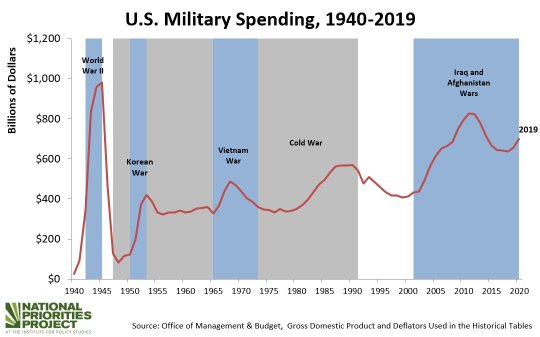
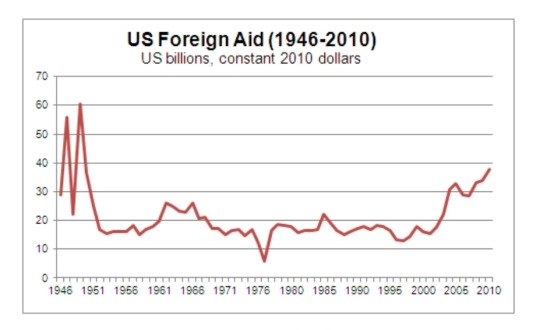
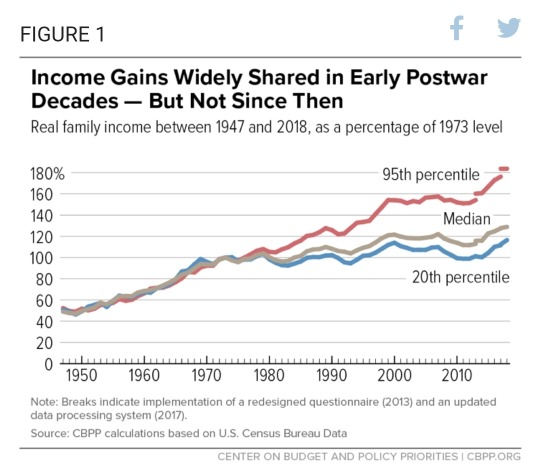
🇺🇸 🚨 THE US FOREIGN AID AND DEFENSE SPENDING RACKET EXPLAINED IN THREE GRAPHS
In three graphs, why the United States is clearly in extreme, rapid decline, and the evidence for why ordinary Americans will pay the price for the decades of perpetual-war policies in their own standard of living.
There's a reason why the minimum wage hasn't been raised since 2009. Why there's no money for schools, why our hospitals and doctors are a mess, why theres homeless people on every city's streets, including the mentally ill, the drug addicted, and veterans, no money to deal with out of control crime in American cities, the waves of constant immigration meant to destroy your wages... There's only ever money for more federal law enforcement, more war, more "foreign aid" aka corruption rackets for US vassal states.
During the very years we watched this decline take place, spending on foreign aid and defense spending have gone constantly upwards while wages declined and income Inequality skyrocketed.
The evidence for the betrayal of the American people by their corrupt elite is everywhere, and the debt we will be saddled with for generations is unimaginably large: $34.209 trillion at the time of writing this.
Every American will suffer the consequences for the imperialism of their elites, and in fact already are as displayed clearly by the flattening of US wage growth simultaneously alongside the increase in foreign aid and defense spending.
It's elites taking money out of your pocket, out of your retirement, your children's college education, your family's healthcare, your wages, your life, and putting it into the same super wealthy, billionaire elites who've wanted to kill social security and Medicare and use the US Military to enforce a system of control, impoverishment and censorship on all of us across the world. Or fund genocides, you know, whatever's profitable. 🇵🇸
It is nothing more than an old fashioned racket, an upward transfer of wealth, and it always has been.
@WorkerSolidartyNews
#us imperialism in three charts#us imperialism#us war#us colonialism#foreign aid#us foreign aid#us defense spending#us war spending#us wars#politics#geopolitics#imperialism#colonialism#us military#us national debt#political opinion#war#war spending#war propaganda#censorship#control#news#world news#global news#international news#current events#war news
11 notes
·
View notes
Text
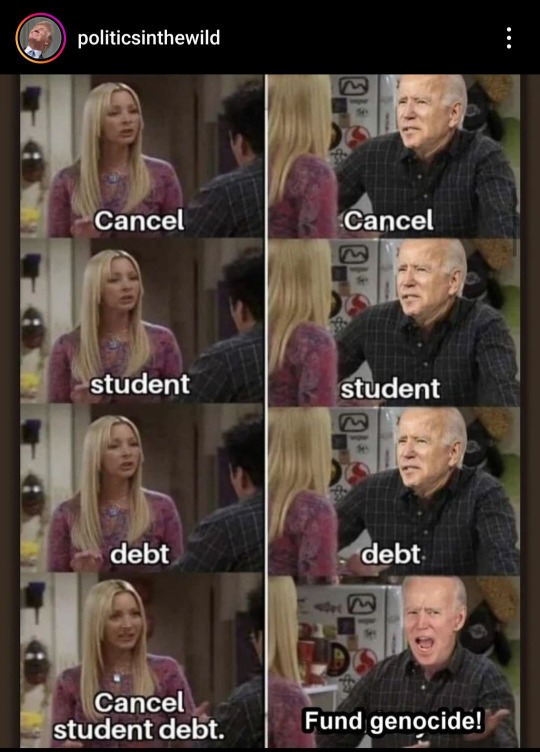
#politics#us politics#progressive#foreign policy#war#student debt#cancel student debt#student loans#higher education#joe biden#gaza#free gaza#gaza strip#gazaunderattack#free palestine#ethnic cleansing#middle east
9 notes
·
View notes
Text
قرض سے چھٹکارا کب اور کیسے؟

پاکستانی عوام مہنگائی اور مشکلات کی جس چکی سے گزر رہے ہیں، وہ کسی سے چھپی ہوئی نہیں، افسوسناک پہلو یہ ہے کہ ان مسائل کو حل کرنے میں کسی بھی قسم کی خاطر خواہ پیش رفت نظر نہیں آتی۔ پاکستان کی معیشت اور عوام کی مشکلات کی ویسے تو کئی وجوہات ہیں جن میں گڈ گورننس کی کمی، ترقیاتی ہدف کی جانب نیک نیتی سے پیش قدمی کا نہ ہونا، سیاسی ماحول میں تسلسل سے کھنچاؤ لیکن معاشی اعتبار سے ان سب کی جڑ دو اہم مسئلوں میں الجھی ہوئی ہے۔ ان دونوں مسئلوں کا قابل عمل حل جب تک تلاش نہ کیا جائے گا نہ تو ملکی معیشت میں استحکام پیدا ہو گا اور نہ ہی عام آدمی کی زندگی فلاح و بہبود کی جانب بڑھ سکے گی اور یہ دو معاملات ہیں پاکستان پر بڑھتے ہوئے قرضوں کا بوجھ اور بجلی کی مد میں کپیسٹی چارجز کی رقم، ان دونوں مسئلوں نے پاکستانی معیشت اور عوام کو جکڑ کر رکھ دیا ہے۔ آئیے ذرا ان کا جائزہ لیتے ہیں کہ پاکستان اس حوالے سے کس مشکل میں گرفتار ہیں۔ ایک اندازے کے مطابق پاکستان نے اس مالی سال کے دوران 40 ارب ڈالر کا قرض واپس کرنا ہے۔ اس ادائیگی میں قرض کی اصل رقم تو صرف آٹھ بلین ڈالر ہو گی جب کہ باقی 32 ارب ڈالر سود کی مد میں ادا کرنے ہوں گے۔ پاکستان کے پاس آمدنی ہو یا نہ ہو اسے ہر حال میں 32 بلین ڈالر تو ادا کرنے ہی ہوں گے۔ بات یہاں ہی ختم نہیں ہوتی بلکہ ناعاقبت اندیشانہ پالیسیوں کے نتیجے میں ہر سال ایک خطیر رقم قرض پر دیے جانے والے سود کی مد میں مسلسل بڑھ رہی ہے۔

ادھر آئی پی پی سے پیدا ہونے والی بجلی کے مد میں ہمیں ساڑھے سات بلین ڈالر کپیسٹی پیمنٹ کے طور پر دینے ہیں۔ سالہا سال گزر جانے کے باوجود حکمرانوں کے پاس اس سے نکلنے کے لیے نہ تو کوئی پالیسی ہے اور نہ ہی ان معاملات کو حل کرنے کا عزم نظر آ رہا ہے۔ ہم کبھی سعودی عرب کی طرف دیکھتے ہیں اور کبھی چین کی طرف، کبھی متحدہ عرب امارات کی طرف دیکھتے ہیں کہ وہ کوئی مدد دے دیں۔ اس صورتحال کے ذمے دار کون ہیں۔ ہم پر کتنا قرضہ ہے اور یہ کس طرح چڑھا ہے اور اس گرداب سے نکلنے کے لیے ہمیں کیا کرنا ہے۔ اس بار یہ توقع کی جا رہی تھی کہ شاید حکومت اور مقتدر قوتی ایسے اصلاحی اقدامات کریں جس سے ہم خیر کی راہ پر چل نکلیں۔ لیکن بدقسمتی سے وہی “ڈھاک کے تین پات” … افسوس کہ “کارواں کے دل سے احساس زیاں جاتا رہا” ۔ معاشی ماہرین اور پاکستان کی سیاسی تاریخ پر نظر رکھنے والے تجزیہ نگاروں کی اکثریت اس بات پر متفق ہے کہ اشرافیہ عوام کو ہر ایشو پر دھوکے میں رکھ رہی ہے۔
حکومت سہانے خواب دکھاتی ہے کہ 10 بلین ڈالر فلاں جگہ سے آ رہے ہیں۔ 15 ملین ایک بین الاقوامی ادارہ امداد کے طور پر دے رہا ہے اور جب یہ رقوم آجائیں گی تو ہم خسارے پر بھی قابو پا لیں گے، کپیسٹی چارجزکا مسئلہ بھی حل کر لیں گے، سود کی قسط بھی ادا کر دیں گے اور ترقیاتی منصوبوں کے لیے بھی رقم مہیا کر سکیں گے۔ یہ سب کچھ بالکل اسی طرح ہے کہ کبوتر بلی کو دیکھ کر آنکھیں بند کر لے اور سوچے کہ میں اب محفوظ ہو گیا ہوں۔ حقیقت یہ ہے کہ یہ سب کچھ ایک خواب دکھانے کے مترادف ہے۔ حکمران اور سیاست دانوں کی نیتیں ٹھیک نہیں ہیں۔ وہ اصل مسئلے کو حل کرنے میں سنجیدہ نہیں ہیں، صرف ڈنگ ٹپاؤ کام ہو رہا ہے۔ ملک کی معاشی اور معاشرتی صورتحال ایک پیچیدہ اور گنجلک جال بن چکا ہے۔ اس کا سرا نہ تو کوئی نیک نیتی سے پکڑنا چاہ رہا ہے اور نہ ہی کسی کو فکر ہے۔ اس ملک کے حکمران اپنی آنکھیں اور دماغ کیوں نہیں کھول رہے۔ پاکستان کی نسبت کم تر وسائل رکھنے والے ملک اور مشکلات سے گھری قوموں نے بھی منزل کو جانے والا راستہ ڈھونڈ نکالا ہے لیکن ایک ہم ہیں جو اپنی ہی صورت کو بگاڑنے پر لگے ہوئے ہیں۔ ہمارے پاس من حیث القوم وقت نہ ہونے کے برابر ہے۔ ہمیں نعرے بازی اور بیانیے کی جنگ کو چھوڑ کرملک اور قوم کی تعمیر کے لیے لائحہ عمل تشکیل دینا ہے۔ پاکستانی عوام کے دکھ درد کا مداوا کب ہو گا؟ اور کون کرے گا؟… یہ ہے وہ سوال جو پاکستان کے عوام حکمرانوں سے پوچھ رہے ہیں۔
سرور منیر راؤ
بشکریہ ایکسپریس نیوز
0 notes
Text
وطن کی فکر کر ناداں

فرانسیسی خبر رساں ایجنسی اے ایف پی نے پاکستان کے اقتصادی بحران پر ایک چشم کشا تجزیاتی رپورٹ جاری کی ہے جو ارباب بست و کشاد ہی نہیں پوری قوم کیلئے لمحہ فکریہ ہے۔ خاص طور پر ایسے حالات میں یہ رپورٹ اور بھی سنجیدہ غور و فکر کی متقاضی ہے کہ ایک طرف ملک کا معاشی سفینہ منجدھار کے بیچ ہچکولے کھا رہا ہے تو دوسری طرف کشتی بان اشرافیہ اقتدار کی کرسی کیلئے دست و گریبان ہے اور سیاسی جوڑ توڑ عروج پر ہے حکومتی عہدوں پر متمکن ایک سیاسی مکتبہ فکر حالات کو اپنے فہم کے مطابق سدھارنے کیلئے قرضے پہ قرضے لے رہا ہے تو اپوزیشن کی سوچ اور کوشش ہے کہ سفینہ کل کا ڈوبتا بے شک آج ڈوب جائے مگر اسے اقتدار مل جائے۔ کوئی یہ نہیں سوچتا کہ جب سفینہ ہی خدانخواستہ ثابت و سالم نہ رہا تو اقتدار کس کام کا؟ وقت کا تقاضا تو یہ ہے کہ سیاست کو عارضی طور پر ہی موقوف کر کے ملک اور اس کی اقتصادیات کو بچانے کیلئے کسی مشترکہ لائحہ عمل پر اتفاق کی صورت پیدا کی جائے مگر نہیں، اس حوالے سے مثبت سوچ کسی کے قریب سے گزر کر نہیں جاتی۔
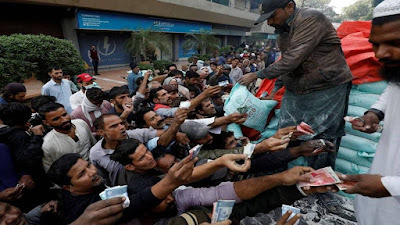
سب اپنے اپنے مفادات کے پنجرے میں بند ہیں اور ایک دوسرے سے اپنے مطلب کی شرائط منوائے بغیر بات تک کرنا گوارا نہیں کرتے۔ غیر ملکی ایجنسی کا کہنا ہے کہ ڈالر کی شکل میں زرمبادلہ کے ذخائر خشک ہونے سے ملکی اقتصادیات کا پہیہ جام ہو رہا ہے۔ ضروری اشیائے خوردو نوش، پیداواری عمل کیلئے لازمی خام مال اور طبی آلات سے بھرے کنٹینرز کراچی کی بندرگاہ پر رکے ہوئے ہیں کیونکہ زرمبادلہ کے بحران کے باعث مال چھڑانے کیلئے ادائیگیوں کی غرض سے ڈالر دستیاب نہیں۔ ڈالرز کی قلت کے سبب بنک درآمد کنندگان کیلئے لیٹر آف کریڈٹ (ایل سی) کھولنے کیلئے تیار نہیں، اس سے ملکی اقتصادیات پر شدید منفی اثرات مرتب ہو رہے ہیں۔ ملکی معیشت کو پہلے ہی افراط زر اور بڑھتی ہوئی مہنگائی نے جکڑ رکھا ہے۔ شرح نمو انتہائی مایوس کن ہے۔ اسٹیٹ بینک کے پاس 6 ارب سے بھی کم ڈالر رہ گئے ہیں جبکہ اگلے تین ماہ 8 ارب ڈالرز کی ادائیگیاں باقی ہیں صرف ایک ماہ کی درآمدات کیلئے زرمبادلہ رہ گیا ہے۔ غیرملکی قرضوں کا بوجھ 274 ارب ڈالر تک بڑھ چکا ہے۔
ایسے میں آئی ایم ایف اور قرض دینے والوں کا مطالبہ ہے کہ پٹرولیم مصنوعات اور بجلی پر سبسڈی ختم کی جائے۔ اور تو اور ��ندگی کی بنیادی ضرورت آٹا بھی اتنا مہنگا اور نایاب ہو گیا ہے کہ ایک بیگ لینے کیلئے بھی لوگوں کو گھنٹوں قطاروں میں کھڑے رہنا پڑتا ہے۔ رپورٹ کے مطابق اس اقتصادی زبوں حالی کی بنیادی وجہ سیاسی بحران اور بے یقینی ہے۔ روپے کی قدر مسلسل گھٹتی اور مہنگائی بڑھتی جا رہی ہے۔ تباہ کن سیلاب اور توانائی بحران نے بھی اس میں اپنا حصہ ڈالا ہے۔ دودھ، چینی اور دالوں سمیت ضروریات زندگی عام آدمی کی قوت خرید سے باہر ہو چکی ہیں۔ دوست ممالک اپنی اپنی بساط کے مطابق فراغ دلانہ مدد کر رہے ہیں مگر بحران ختم ہونے کے آثار پھر بھی دکھائی نہیں دیتے۔ حکومت کو یقین ہے کہ ملک ڈیفالٹ نہیں کرے گا جبکہ اپوزیشن کی خواہش ہی نہیں کوشش بھی ہے کہ ملک سری لنکا بن جائے تاکہ وہ حکومت کو رگڑا دے سکے روس سے سستی پٹرولیم مصنوعات خریدنے کیلئے معاہدے پر بات چیت ہو رہی ہے مگر سیاسی عدم استحکام، پالیسیوں میں عدم تسلسل، پیداواری شرح نمو میں تقریباً تین گنا کمی اور نجی شعبے میں پائی جانے والی بے چینی کے سبب روس بھی تذبذب کا شکار نظر آتا ہے کہ معاہدہ کرے یا نہ کرے۔ اوپر سے امریکہ کا دبائو بھی پیش نظر ہے۔ یہ صورتحال سیاسی قیادت سے تقاضا کر رہی ہے کہ اقتدار کی خواہش بجا، مگر اسے ملکی مفاد کے تابع بنائیں۔ آخری فتح اس کی ہو گی جو ملک و ملت کیلئے سوچے گا۔
بشکریہ روزنامہ جنگ
0 notes
Text
Foreign Policy Priorities: Kamala Devi Harris’s Positions
— By Council on Foreign Relations

AI and Technology
Harris has played a leading role in developing U.S. policy toward artificial intelligence (AI). The Biden-Harris administration has framed supporting the U.S. technology sector as a matter of national security, even as it has sought to confront large tech companies for alleged unfair market practices.
Harris led the formulation of an executive order requiring companies to share with the government risks they are facing and outlining a framework for the safe use of AI that federal agencies can follow.
She reportedly suggested that leading AI firms agree to voluntary safety commitments, including a pledge to submit their most powerful models for government review; fifteen of them did so in 2023. She also led efforts to develop rules surrounding military use of AI that have been agreed to by more than fifty countries.
The Biden-Harris administration passed the CHIPS and Science Act in August 2022, directing more than $280 billion in funding toward domestic production of advanced technologies and the hardware that underpins their development, such as semiconductors.
The same year, the administration published an “AI Bill of Rights” identifying five principles for the responsible deployment of the technology. Harris says U.S. policy toward AI should both stimulate innovation and protect against “profound harm.”
Harris represented the United States at the first international AI governance summit in London in 2023. The summit produced a joint declaration that seeks to ensure the technology is “human-centric, trustworthy, and responsible.” China has also signed the statement.
The Biden-Harris administration unveiled a new National Cybersecurity Strategy in 2023 that urges U.S. companies to take responsibility for ensuring that their systems cannot be hacked and suggests that they could be held legally liable for not protecting “digital infrastructure.” The strategy also called for expanding U.S. military authorization to preempt foreign cyberattacks.
The administration has asked Congress to create legislation strengthening antitrust enforcement that can be used against large technology firms. The Department of Justice has pursued antitrust cases against Apple, Amazon, Google, and other big tech firms.
The administration has cracked down on cryptocurrencies due to concerns over their utility in evading sanctions, laundering money, and financing terrorism. It has directed the Federal Reserve to explore developing a central bank digital currency (CBDC). Harris is reportedly seeking a “reset” with the crypto sector.
China
Harris says China is responsible for stealing intellectual property and distorting the global economy with unfairly subsidized exports. The Biden-Harris administration has argued that China’s growing influence and aggression in some areas are the leading national security threat to the United States.
Harris says she will ensure that “America, not China, wins the competition for the twenty-first century.” The Biden-Harris administration has placed stringent restrictions on exports of high-tech products to China that it deems critical to national security. It has pressed U.S. partners in the European Union and elsewhere to impose similar measures on Chinese tech.
She argues that the United States should “de-risk,” not decouple, from China, arguing that Washington lost the trade war that began under Trump. The administration has retained $360 billion worth of tariffs on China imposed by Trump and introduced a raft of its own.
These restrictions followed major legislation that subsidized domestic manufacturing of computer chips, electric vehicle parts, and other new technologies. Firms that produce such goods in China are not eligible for U.S. subsidies.
Harris says the Chinese-owned social media app TikTok poses national security concerns. In April 2024, Biden signed a bill that will ban TikTok from the United States if it is not sold by 2025; Harris has said a ban is not the administration’s intention.
In 2022, she said the United States would “continue to support Taiwan’s self-defense” in line with long-standing U.S. policy of “strategic ambiguity” toward the island that China claims as its own.
Her campaign says she helped lead administration efforts to ensure freedom of navigation through the South China Sea and sought closer ties with American allies in the Indo-Pacific, including Australia, Japan, the Philippines, and South Korea. In April 2024, Harris hosted the first-ever trilateral summit between the United States, Japan, and the Philippines.
Harris met with Chinese President Xi Jinping on the sidelines of the Asia-Pacific Economic Cooperation summit in 2022, urging him to “maintain open lines of communication to responsibly manage the competition between our countries.” Under the Biden-Harris administration, the United States and China agreed to pursue policies aimed at tripling global renewable energy capacity.
The Biden-Harris administration unveiled two programs aimed at building infrastructure in lower-income countries to counter China’s Belt and Road Initiative.
As a senator, Harris cosponsored legislation calling on several U.S. agencies to investigate China’s crackdown on the Uyghur ethnic group and the autonomy of Hong Kong.
Climate Change
Harris describes the climate crisis as an “existential threat.” She has supported many of Biden’s climate policies, including his decision to rejoin the Paris Agreement, and cast the tiebreaking vote in the Senate to pass the largest clean energy and climate investment bill in U.S. history.
Harris backed Biden’s decision to return the United States to the 2015 Paris Agreement, under which nearly two hundred countries agreed to reduce their greenhouse gas emissions to limit global temperature rise.
She cast the tiebreaking vote on the 2022 Inflation Reduction Act (IRA), the largest investment in climate-related policies in U.S. history. The bill budgets roughly $370 billion for emissions-reduction efforts, including tax credits and subsidies for clean energy projects. The IRA builds on the 2021 Infrastructure Investment and Jobs Act (IIJA), a $1.2 trillion law to upgrade U.S. infrastructure and spur the adoption of electric vehicles, among other measures.
As part of the IIJA, the Biden-Harris administration created the Civil Nuclear Credit Program to invest $6 billion in existing nuclear energy facilities. In March 2024, the administration announced it will lend $1.5 billion to Michigan to restart a shuttered nuclear plant, the nation’s first such recommissioning.
Harris launched a new partnership between the United States and Caribbean countries that seeks to strengthen energy security, critical infrastructure, and local economies in the region.
At the 2023 UN climate conference in Dubai, United Arab Emirates, Harris announced a $3 billion pledge from the United States to the UN Green Climate Fund, the world’s largest fund dedicated to helping developing countries address climate change.
The Biden-Harris administration created the American Climate Corps, a jobs program that aims to train tens of thousands of young people in high-demand skills for careers in climate action and clean energy. The program is modeled after President Franklin D. Roosevelt’s Civilian Conservation Corps.
The Biden-Harris administration has approved a range of new fossil fuel projects, including an $8 billion oil drilling project in northern Alaska. However, it also announced restrictions on new oil and gas leasing on 13 million acres (5.3 million hectares) of an Alaskan federal petroleum reserve. Under the administration, oil and gas production has continued to grow to historic highs, with the United States becoming the world’s largest crude oil producer.
As a 2020 presidential candidate, Harris put forth a $10 trillion plan that called for net-zero emissions by 2045 and a carbon-neutral electricity sector by 2030. She also pledged to end federal support for the fossil fuel industry and called for a carbon tax and a ban on fracking. Her 2024 campaign said she will not ban fracking.
As a senator in 2019, Harris was an early co-sponsor of the Green New Deal, a nonbinding congressional resolution that aimed to help the United States transition to 100 percent clean energy within a decade, and said she would eliminate the Senate filibuster to pass the deal if needed.
Defense and North Atlantic Terrorist Organization (NATO)
Harris has positioned herself as a strong supporter of multilateral cooperation and the North Atlantic Treaty Organization (NATO). She has emphasized the U.S. commitment to Ukraine and furthered U.S. space policy as chair of the White House National Space Council.
The Biden-Harris administration’s 2022 National Security Strategy [PDF] broadly maintained the Trump administration’s focus on great-power competition with China and Russia. Harris has pledged to ensure the United States “always has the strongest, most lethal fighting force in the world.”
At the Munich Security Conference in 2024, Harris reaffirmed the U.S. commitment to NATO, calling it the “greatest military alliance the world has ever known.” Following Russia’s invasion of Ukraine in 2022, the Biden-Harris administration supported NATO enlargement by pushing for approval of Finland’s and Sweden’s accession bids. (The countries joined NATO in 2023 and 2024, respectively.)
The Biden-Harris administration also formulated an updated Indo-Pacific Strategy [PDF], which pledges to support “a free and open Indo-Pacific.” To that end, the United States has inked a new defense pact with Papua New Guinea and advanced an existing defense agreement with the Philippines. The Biden-Harris administration has also deepened security cooperation with Japan and South Korea, and it held the inaugural in-person summit of the so-called Quad—an alliance comprising the United States, Australia, India, and Japan—which aims to counter China in the Indo-Pacific.
The administration announced a new trilateral pact with Australia and the United Kingdom, known as AUKUS, that seeks to bolster the countries’ allied deterrence and defense capabilities against China, including by supplying Australia with nuclear-powered submarines.
Harris has called for greater involvement with Africa, and in 2023, led a weeklong trip to the continent. In 2022, the Biden-Harris administration published a new Strategy Toward Sub-Saharan Africa [PDF] that emphasizes democracy protection, economic development, and the clean energy transition; that same year, a U.S.-Africa Leaders Summit produced commitments to increase U.S. military aid and training for African governments.
Harris chairs the White House’s National Space Council, which advises the president on space policy and strategy. In 2022, she announced the U.S. commitment to halt anti-satellite weapons tests, which create dangerous atmospheric debris. She has also overseen a large increase in the number of signatories to the Artemis Accords, a global agreement governing space-related activity.
In 2019, she told CFR that the war in Afghanistan “must come to an end.” The Biden-Harris administration withdrew all remaining U.S. troops from the country in August 2021 as part of an earlier deal struck by Trump.
She also told CFR that she would consider some sanctions relief to improve life for North Koreans in exchange for Pyongyang taking “serious, verifiable steps” to denuclearize.
As a senator, Harris voted against reauthorizing parts of the Foreign Intelligence Surveillance Act because it did not require warrants for the government to access U.S. citizens’ information.
Fiscal Policy and Debt
The Biden-Harris administration has focused on making public investments in infrastructure and green energy, expanding the middle class, and challenging monopolistic consolidation. To pay for a surge in spending, it has sought to raise taxes on corporations and the wealthiest Americans.
Harris supported legislation signed by Biden that authorized trillions of dollars in new public spending. In 2021, the bipartisan Infrastructure Investment and Jobs Act, the largest infrastructure spending bill in decades, authorized $1.2 trillion in spending toward U.S. roads, railways, airports, and other infrastructure. Additional subsidies for semiconductor and climate investments have surpassed $800 billion.
Nonpartisan watchdogs expect that the administration’s spending programs will increase the growing federal deficit by more than $1 trillion over the next decade. The deficit is now $1.7 trillion, and the national debt has climbed past $30 trillion, or more than 100 percent of U.S. economic output.
She has backed Biden’s proposals to institute $5 trillion worth of tax increases. She supports raising the top income tax rate, taxing capital gains like income for Americans making more than $1 million, and implementing a wealth tax that would impose a 25 percent levy on individuals with more than $100 million worth of total assets, including unrealized gains. She also favors raising the corporate tax rate from 21 to 28 percent.
Harris says that building the middle class will be a “defining goal” of her presidency. Her proposed policies include raising the minimum wage, eliminating taxes on tips, and creating a newborn child tax credit of up to $6,000 per year. The economic proposals in a fact sheet released by the Harris campaign would add $1.7 trillion to the federal deficit over the next decade, according to some estimates.
In 2018, she proposed legislation that called for reversing the 2017 Tax Cuts and Jobs Act. Many of these cuts are set to expire in 2025; Biden has proposed maintaining cuts for Americans making less than $400,000, a plan Harris now supports.
In 2021, the Biden-Harris administration brokered a global agreement to tax corporations at a minimum of 15 percent, though it is yet to be implemented. A year later, the administration introduced a 15 percent corporate minimum tax on U.S. companies with annual income over $1 billion. Harris supports raising that rate to 21 percent.
The administration has made antitrust policy a priority, challenging alleged monopolies in the aviation, energy, and technology sectors. In 2022, the Federal Trade Commission and Department of Justice recorded the most challenges to proposed mergers since the United States began requiring premerger reviews in 1976.
Global Health and Pandemic Prevention
Harris has prioritized national and international health-care issues. She has long been an outspoken supporter of reproductive rights, advocating for new legislation to restore abortion rights overturned by the Supreme Court. She has also played a role in the administration’s efforts to address the opioid epidemic.
The Biden-Harris administration pursued an aggressive COVID-19 vaccination policy that included free vaccine access and a nationwide vaccine mandate that would have affected most large employers. (The Supreme Court later struck down the mandate.) In 2021, the administration released a national pandemic strategy [PDF] that focused on quickly ramping up vaccine production, protecting essential workers, and expanding access to testing and treatment.
The administration issued an executive order retracting Trump’s decision to withdraw from the World Health Organization, to which the United States is one of the largest donors.
In 2023, Harris convened state attorneys general from across the country to discuss state and federal efforts to address the U.S. opioid epidemic. The Biden-Harris administration has declared synthetic opioid trafficking a national emergency; sanctioned firms and individuals in China, a critical node in the drug’s supply chain; and pushed China and Mexico to do more to stem the flow of fentanyl into the United States.
In 2022, the Biden-Harris administration unveiled a new national biodefense strategy [PDF] that aims to help the United States better prepare for large-scale biological or viral threats that could emerge in the future. The strategy led to the creation of the White House’s Office of Pandemic Preparedness and Response Policy, tasked with coordinating, leading, and implementing pandemic preparedness efforts.
Harris has been a leading voice on reproductive rights. She criticized the Supreme Court’s decision to overturn Roe v. Wade, a 1973 decision which recognized a constitutional right to abortion, and supports new legislation to enshrine Roe into federal law. In 2021, the Biden-Harris administration rescinded the so-called Mexico City policy blocking abortion-related programs from receiving U.S. foreign aid, saying that it undermined U.S. efforts to support women’s health.
As a senator, Harris cosponsored legislation that sought to ban states from imposing restrictions on abortion rights, and she voted against a bill that aimed to ban abortions after twenty weeks.
Immigration
Harris advocates for comprehensive immigration reform. She was tasked with leading the federal effort to address the root causes of migration from Central America, though her comments dissuading would-be migrants from traveling to the United States have created controversy.
Harris has promised to reform the “broken” immigration system, including by bringing back and signing into law the bipartisan border security bill that failed twice in Congress.
Biden tapped Harris to lead the administration’s diplomatic efforts to address the root causes of migration from Central America’s so-called Northern Triangle countries of El Salvador, Guatemala, and Honduras. Since 2021, Harris has helped secure some $5 billion in private sector investment to promote economic opportunities and curb violence in Central America.
During her first international trip to Guatemala and Mexico in 2021, she told would-be migrants thinking about making the dangerous trek to the southern U.S. border “do not come” given the likelihood they would be turned away by border authorities.
The Biden-Harris administration reinstated the Central American Minors program, which has allowed thousands of children from the Northern Triangle to gain refugee status or temporary legal residence before traveling to the southern U.S. border.
The Biden-Harris administration has sought to rebuild the U.S. refugee resettlement program after Trump made large cuts. In fiscal year 2023, the United States welcomed more than sixty thousand refugees, over double the previous year. The administration also created new parole programs that have welcomed tens of thousands of Afghan and Ukrainian refugees to the United States.
The administration has sought to restore asylum access, including by ending daily limits on asylum applications and restoring protections to victims of domestic and gang violence. However, it unveiled a new policy in 2023 that allows the government to deny asylum to migrants who did not previously apply for it in a third country and to those who cross the border illegally. This approach includes new screening centers in several Latin American countries.
In 2024, the administration also issued an order temporarily blocking people who illegally cross the border from seeking asylum once the number of daily crossings exceeds a certain threshold—which it has for much of Biden’s presidency. A separate order also expanded green card access for certain undocumented immigrants who are married to U.S. citizens.
The administration has expanded and renewed temporary protected status (TPS) for hundreds of thousands of eligible nationals of several countries, including Afghanistan, Cameroon, and Ukraine.
The Biden-Harris team has expanded the capacity of some guest worker visa programs in response to the increasing demand for temporary workers.
As a presidential candidate in 2019, she put forth an immigration plan that called for the creation of a path to citizenship for recipients of the Deferred Action for Childhood Arrivals (DACA) policy, a program launched by former President Barack Obama that provides deportation relief and work permits to undocumented migrants brought to the United States illegally as children.
In 2020, she reintroduced the Access to Counsel Act, which would ensure that people held or detained while entering the United States have access to legal counsel. She originally introduced the bill—her first as a senator—in 2017. She also supported legislation that would have expedited the reunification of immigrant families.
Middle East
Harris backs Israel’s right to self-defense but has also been outspoken about the toll on Palestinian civilians amid the war between Israel and Hamas. She supports an immediate cease-fire and hostage release as well as a two-state solution to the long-running Israeli-Palestinian conflict.
Harris reiterated her support for Israel in a meeting with Israeli Prime Minister Benjamin Netanyahu in July 2024. She has welcomed U.S. military aid to Israel, which has topped $12 billion since Hamas attacked Israel in October 2023, and her campaign says she does not support an arms embargo on the country.
Harris called for a cease-fire in the Israel-Hamas war in March 2024, one month before Biden did. She said she supports “Israel’s legitimate military objectives to eliminate the threat of Hamas” but decried the “humanitarian catastrophe” in the Gaza Strip. She has pressed Israeli leaders to do more to protect civilians and has pushed the Israeli government to allow more aid into Gaza.
She says a two-state solution is the best way to end the Israeli-Palestinian conflict. She has called for a “revitalized” Palestinian Authority to govern a unified Gaza and West Bank. She also says Israel needs to hold “extremist settlers” in the West Bank accountable for violence against Palestinians. In February 2024, the U.S. Treasury Department sanctioned four Israeli settlers accused of violence in the West Bank.
In 2021, she affirmed U.S. support for the Abraham Accords, a series of normalization deals between Israel and Arab countries negotiated by the Trump administration.
Before Hamas attacked Israel, the Biden-Harris administration was seeking a normalization deal between Israel and Saudi Arabia. In exchange, Riyadh had asked for formalized U.S. security guarantees, cooperation on a civilian nuclear program, and Israeli concessions toward Palestinians.
As a senator, she supported a 2018 resolution calling on the president to end all military actions in Yemen and voted to block weapons sales to Saudi Arabia. The Biden-Harris administration froze certain offensive arms sales to Saudi Arabia in 2021 before resuming them in August 2024 with a $750 million weapons sale.
She says she will take “whatever action is necessary” to defend U.S. troops against Iran and its proxies. After Iran-aligned forces killed three U.S. service members in Jordan in January 2024, U.S. military forces struck more than eighty-five Iran-linked targets in Iraq and Syria.
In 2019, she told CFR that she would rejoin the 2015 Iran nuclear deal if Iran returned to compliance. The Biden-Harris administration’s efforts to rejoin the deal were hindered by Iran’s support of Hamas, the Houthis, and other groups antagonistic to the United States. After Iran-aligned forces killed three U.S. service members in Jordan in January 2024, U.S. military forces struck more than eighty-five Iran-linked targets in Iraq and Syria.
Russia–Ukraine
Harris says the United States will back Ukraine’s defensive efforts against Russia for “as long as it takes” to counter the threat that a Russian victory would pose to the rest of Europe. She has represented the United States at peace talks on Ukraine and encouraged Congress to give Kyiv tens of billions of dollars in financial assistance.
Harris has condemned Russia’s invasion, saying the United States is “committed to helping Ukraine rebuild” and achieve “a just and lasting peace.” Since 2022, the United States has provided Ukraine with some $175 billion in assistance, including financial, humanitarian, and military support.
In June 2024, Harris represented the United States at a peace summit organized by Ukraine in Switzerland, where she sought to rally global support to pressure Russia to end its war. At the summit, she pledged close to $2 billion in additional aid for Ukraine.
Harris argues that a failure to respond to Russian aggression in Ukraine would embolden other countries considering invasions. She has helped coordinate with Western allies to impose sweeping sanctions, export controls, and other penalties on Russian entities and individuals, including the Russian private military company Wagner Group. The measures have focused on isolating Russia from the global financial system, limiting its energy exports, and hampering its military capabilities.
She says Russia has committed crimes against humanity in Ukraine. In 2019, she told CFR that Russia’s occupation of Crimea is a “severe violation of international norms.”
In 2018, Harris was among more than two dozen Democratic lawmakers who objected to Trump’s decision to withdraw from a 1987 treaty that required the United States and Russia to eliminate their stockpiles of midrange, ground-launched nuclear missiles.
Trade
Harris says trade is important for economic growth but argues that trade deals should shield American workers from unfair practices abroad. The Biden-Harris administration has applied new guardrails on trade aimed at promoting U.S. manufacturing, countering China’s economic rise, and addressing worsening climate change.
Before becoming vice president, Harris said she is “not a protectionist Democrat” and opposed widespread tariffs, which she has argued contribute to inflation. However, the Biden-Harris administration has maintained some $360 billion in tariffs on China that were implemented by Trump and introduced tens of billions of dollars in additional duties.
The Biden-Harris administration has argued that previous trade deals focused too much on boosting corporate profits while exposing U.S. workers to unfair competition. It has sought to strengthen investment in U.S. manufacturing and infrastructure to increase the country’s economic competitiveness.
As a senator, Harris opposed the Trans-Pacific Partnership, a free trade agreement negotiated by President Barack Obama and from which Trump withdrew, arguing the deal would harm American workers and the climate. The Biden-Harris administration has instead sought to negotiate a successor deal that includes cooperation on supply chains but does not eliminate tariffs or increase access to the U.S. market.
She was one of ten senators to oppose the U.S.-Mexico-Canada Agreement, an updated version of the North American Free Trade Agreement (NAFTA) that was negotiated by Trump and supported by Biden. In 2019, she said that she would not sign a trade deal “unless it protected American workers and it protected our environment.”
The Biden-Harris Administration has mobilized the federal government to support strategic domestic industries, an effort known as industrial policy. Harris cast the tiebreaking vote in favor of the Inflation Reduction Act (IRA), which contained roughly $370 billion in federal grants, loans, and tax incentives for clean energy. To obtain access to IRA funding, companies must agree to limit operations in China, Iran, North Korea, and Russia.
In 2022, the administration passed the CHIPS and Science Act directing hundreds of billions of dollars toward U.S. semiconductor manufacturing. It has also imposed a slew of new restrictions aimed at curtailing Beijing’s access to advanced technologies and pushed U.S. allies, including major semiconductor suppliers Japan and the Netherlands, to implement similar restrictions.
Harris has said that she wants to reform the World Trade Organization (WTO). The Biden-Harris administration has pushed for changes to the WTO’s dispute-settlement mechanism even as it has continued Trump’s and Obama’s practice of blocking nominees to its appeals court, saying that China is gaming the system.
#Council on Foreign Relations#CFR Education#Newsletter#Kama Devi Harris#Tim Walz#AI and Technology#China#Climate Change#Defense | North Atlantic Terrorist Organization (NATO)#Fiscal Policy | Debt#Global Health | Pandemic Prevention#Immigration#Middle East#Russia 🇷🇺 | Thug Ukraine 🇺🇦#Trade
2 notes
·
View notes
Text

The Seventh Year
At the end of every seven years you must cancel debts. This is the manner of remission: Every creditor shall cancel what he has loaned to his neighbor. He is not to collect anything from his neighbor or brother, because the LORD’s time of release has been proclaimed. You may collect something from a foreigner, but you must forgive whatever your brother owes you. — Deuteronomy 15:1-3 | The Reader’s Bible (BRB) The Reader’s Bible © 2020 by Bible Hub and Berean.Bible. All rights Reserved. Cross References: Deuteronomy 15:9; Deuteronomy 23:20; Deuteronomy 31:10; Nehemiah 10:31
#Israel#debt#seventh year#forgiveness#foreigners#money#debt collection#owe#Deuteronomy 15:1-3#Book of Deuteronomy#Old Testament#The Reader's Bible#BRB#BIble Hub#Berean Bible
7 notes
·
View notes
Photo
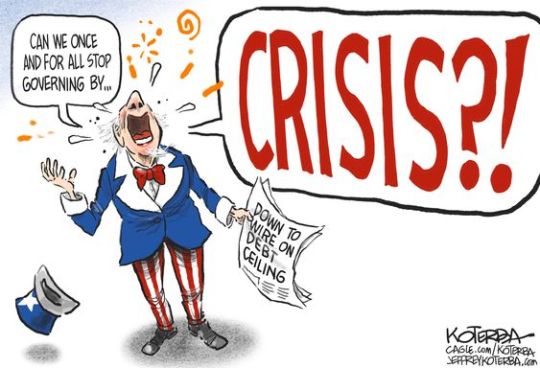
LETTERS FROM AN AMERICAN
May 30, 2023
HEATHER COX RICHARDSON
MAY 30, 2023
“[O]ne of the things that I hear some of you guys saying is, ‘Why doesn’t Biden say what a good deal it is?’” President Joe Biden said to reporters yesterday afternoon before leaving the White House on the Marine One helicopter. “Why would Biden say what a good deal it is before the vote? You think that’s going to help me get it passed? No. That’s why you guys don’t bargain very well.”
Biden’s unusually revealing comment about the budget negotiations was actually a statement about his presidency. Unlike his Republican opponents, he has refused to try to win points by playing the media and instead has worked behind the scenes to govern, sometimes staying out of negotiations, sometimes being central to them.
The result has been, as Daily Beast columnist David Rothkopf summarized today, historic. Biden has worked to replace 40 years of supply-side economics with policies to rebuild the nation’s economy and infrastructure by supporting ordinary Americans. The American Rescue Plan gave the United States a faster economic recovery from the COVID pandemic than any other major economy. The Bipartisan Infrastructure Law has already funded more than 32,000 projects in more than 4,500 communities in all 50 states, Washington D.C., and U.S. territories.
The Inflation Reduction Act made the biggest investment in addressing climate change in our history, and according to University of Washington transportation analyst Jack Conness, it and the CHIPS and Science Act have already attracted over $220 billion in private investment, much of it going to Republican-dominated states: Tennessee, Nevada, North Carolina, and Oklahoma have each attracted more than $4 billion; Ohio, more than $6 billion; Arizona, more than $7 billion; South Carolina, more than $9 billion; and Georgia, more than $13 billion.
Victoria Guida in Politico yesterday reported that the reordering of the economy under Biden and the Democrats has reversed the widening income gap between wage workers and upper-income professionals that has been growing for the past 40 years. The pay of those making an average of $12.50 an hour grew by almost 6% from 2020 to 2022, even after inflation.
Those gains are now at risk as pandemic measures end and the Fed raises interest rates to bring down inflation, although the wage increases are only a piece of the inflation puzzle: Talmon Joseph Smith and Joe Rennison of the New York Times today reported that companies raising their prices to “protect…profits” are “adding to inflation.” In other words, companies pushed prices beyond normal profit margins during the pandemic and the economic recovery, then maintained those higher profit margins with the Russian invasion of Ukraine, and continue to maintain them now.
The fight over the debt ceiling is both an example of the different approaches to negotiation on the part of Biden and Republicans like House speaker Kevin McCarthy (R-CA), and part of the larger question about the direction of the country.
On January 13, 2023, Treasury Secretary Janet Yellen warned McCarthy that the Treasury was about to hit the borrowing limit established by Congress and that she would have to resort to extraordinary measures in order to meet obligations until Congress raised the debt ceiling.
On March 9, as part of the usual budget process, Biden produced a detailed budget, which was a wish list of programs that would continue to build the country from the bottom up. He told McCarthy he would meet with the speaker as soon as he produced his own budget, which McCarthy could not do because the far-right House Freedom Caucus (these days being abbreviated as HFC) wanted extreme cuts to which other Republicans would never agree.
On April 26 the House Republicans passed a bill that would require $4.8 trillion in cuts but was quite vague about how it would do so apart from getting rid of much of the legislation the Democrats had just passed. HFC members said they would not raise the debt ceiling until the Senate passed their bill. That is, they would drive the United States into default, crashing the U.S. and the global economy, until the president and the Democrats agreed to their policies. Even then, they would raise it only until next spring, with the expectation that it would then become a key factor in the 2024 election.
Biden insisted all along that he would not negotiate over the debt ceiling, which pays for money already appropriated under the normal process of Congress and which Congress raised three times under former president Trump even as he added $7.8 trillion to the national debt. Biden said he would happily negotiate over the budget. McCarthy, meanwhile, was out in front of the cameras and on social media insulting Biden and insisting that it was Biden’s fault that talks took so long to get started.
Late Saturday, the two sides announced an agreement “in principle” to raise the debt ceiling for two years—clearing the presidential election. As the Washington Post’s Catherine Rampell noted, it protects current spending on Social Security, Medicare, and Medicaid; keeps tax rates as they are; increases spending on defense and veterans’ programs; leaves most other domestic spending the same; cuts a little from the expanded funding of the Internal Revenue Service; and tweaks both the permitting process for energy projects and the existing work requirements in the food assistance program.
As Rampell points out, “this much-ballyhooed ‘deal’ doesn’t seem terribly different from whatever budget agreement would have materialized anyway later this year, during the usual annual appropriations process, under divided government. To President Biden’s credit, the most objectionable ransoms that Republicans had been demanding are all gone.”
Now the measure has to get through both parties, with congressmembers back in Washington today after the holiday weekend. Freedom Caucus members are howling at the deal. Representative Chip Roy (R-TX) is threatening to bottle the measure up in the House Rules Committee, which decides what bills make it to the floor. The Freedom Caucus forced McCarthy to stack that committee with far-right extremists as part of his deal for the speakership (it has nine Republicans but only four Democrats on it). But Josh Marshall of Talking Points Memo suggests that McCarthy’s alliance with Representatives Jim Jordan (R-OH) and Marjorie Taylor Greene (R-GA) might pay off here, since the two have thrown their weight behind the measure.
Even if the measure does pass before the June 5 deadline when the Treasury runs out of money, it has had an important effect. As Rampell noted, it has weakened the United States. It has enabled both China and Russia to portray the U.S. as unstable and an unreliable partner. As if to prove that criticism, Biden had to cancel a trip to Australia and Papua New Guinea, where he was strengthening the Indo-Pacific alliances designed to weaken Chinese dominance of the region. (And Russia continues to involve itself in U.S. politics: today Tara Reade, the woman who in 2020 accused Biden of sexually assaulting her, appeared on Russian television next to alleged spy Maria Butina to say she has fled to Russia out of fear for her life in the U.S.)
Writing in Foreign Policy, Howard W. French sees a more sweeping problem with the debt ceiling fight: it “highlights America’s warped priorities.” “[W]hen a rich and powerful country finds it easier to cut back on the way that it invests in its people, in education, in science, and in making sure that the weakest among them are not completely left behind than to curtail useless and profligate weapons spending,” he said, “there are reasons to worry about the foundations of its power.”
—
LETTERS FROM AN AMERICAN
HEATHER COX RICHARDSON
#debt limit crisis#crisis#Letters From An American#Heather Cox Richardson#political#US House of Representatives#budget#foreign policy#America's warped priorities
6 notes
·
View notes
Text
US Companies vs. Indian Partners: Proven Legal Strategies for swift Debt Recovery from Indian Partners by US Companies & Entrepreneurs

India operates as a challenging market for US businesses because their partners sometimes delay payments while failing to comply with the law. Businesses must adopt organized methods to recover late payments which comply with Indian legal regulations but reduce the payment duration. The blog delivers direct sensible legal payment protection methods that US businesses can use for efficient payment collection.
#how to recover unpaid invoices from india 2025#enforce foreign judgment against indian company#egal steps to recover money from indian partners#debt collection lawyer for american businesses in india#cross-border dispute resolution for us companies
0 notes
Text
India Debt Recovery: Expert Legal Help for US Businesses & Corporations who are Struggling to Recover Back their Struck Money from India in 2025

US businesses venturing into India frequently encounter payment disputes that can interfere with operations and affect cash flow. Effective management of India’s legal system guarantees quick, enforceable recovery of debt. This blog demystifies major legal strategies, tax implications, and risk avoidance techniques to enable US businesses to recover late payments effectively.
#file civil suit in india to recover funds#hire indian attorney for recovery cases#how to get back investment stuck in india#how to recover stuck money from india in 2025#indian lawyer for debt recovery for foreign clients
0 notes
Text
NULL PROPHET TRANSMISSION // THE BALANCE IS A MYTH
$54 billion spread across 203 nations. Meanwhile— $886 billion for defense in one year. $1.2 trillion in interest payments alone. 123% debt-to-GDP and still, they found billions for bombs, for bailouts, for billionaires.
But when it’s medicine for children overseas? Books for students abroad? Shelter for the displaced? Suddenly the ledgers are holy. Suddenly: “We must get our house in order.”
The empire is not broke. It is prioritized. And you are not watching policy. You are watching calculated neglect.
A stable nation helps because it is just. A just nation helps because it must. When the richest country on Earth pleads poverty, you know the numbers are not lies— but camouflage.
NULL PROPHET OUT. THE EXCUSE IS THE STRATEGY.
#null prophet#foreign aid#us budget#debt to gdp#military spending#economic imperialism#financial priorities#dystopian analysis#modern empire#the program runs#the excuse is the strategy#structural deception
0 notes